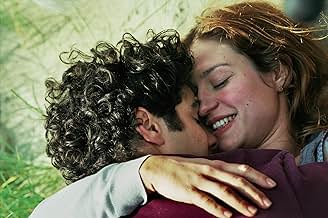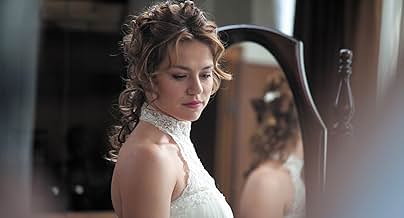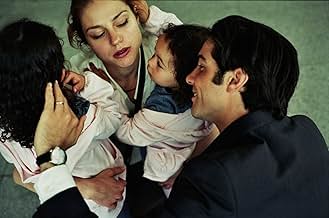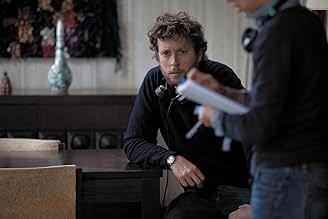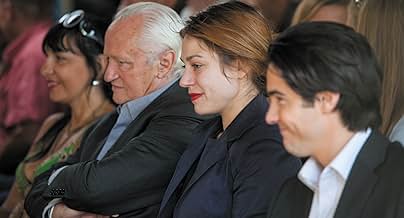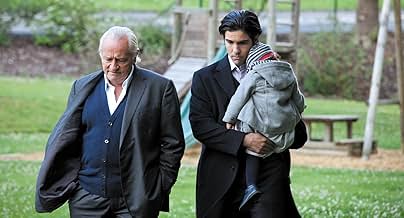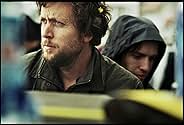NOTE IMDb
6,8/10
3,2 k
MA NOTE
Ajouter une intrigue dans votre langueHappy couple, will marry and have children under the roof of the benevolent Doctor. Little by little, relationships become complex, suffocating the couple and the family, who are unaware of ... Tout lireHappy couple, will marry and have children under the roof of the benevolent Doctor. Little by little, relationships become complex, suffocating the couple and the family, who are unaware of the tragic end towards which they are headingHappy couple, will marry and have children under the roof of the benevolent Doctor. Little by little, relationships become complex, suffocating the couple and the family, who are unaware of the tragic end towards which they are heading
- Réalisation
- Scénario
- Casting principal
- Récompenses
- 9 victoires et 12 nominations au total
Avis à la une
What happens when a boy and girl meet from different cultures?
The excitement, the thrill, the joy of falling in LOVEz and spending life together. The dreamZ - the future plans etc.
Years go by - the babies are born, the work and life eats up the relationship The evil of time - deteriorates and suffocates everything we stood for.
This movie is about two lovers - Mounir (Tahir Rahim) a Morrocan immigrant living in Belgium and a Belgian girl Murielie (Emilie Dequence) falling in LOVEz and supported by the God-father of Mounir - Dr. Andre (Niels Arestrup) from being a catalyst in forming their LOVE-bond to blessing the couple to being with them in their honeymoon, to giving them shelter, money, food and even supporting their children.
Then what could go wrong? Murielie wanted freedom as a couple to live alone - and enjoy life, away from Dr.Andre - who uses kindness as blackmail and trap the young couple. Murielie feels suffocated and whenever she discusses with Mounir he always takes sides of Dr.Andre. Thus slowly and slowly Murielie feels isolated, disintegrated, and depressed becomes a routine housewives, bearing four beautiful children - caged and imprisoned within the burden of goodness and kindness shown by Dr.Andre.
What results in the end is so horrific and chilling that one goes aghast at the outcome.
It leaves the viewers devastated to say the least - viewing a claustrophobic tragedy destined to happen.
This superb movie is based on a true story.
It is a GREAT psychological drama of how slowly un-noticed the depression sets in through "subtle" everyday interaction of routine life and daily household chores. How a person feels isolated, neglected in a relationship, and above all how PATRIARCHY destroys completely a spirited young woman with dreams
The Director Joachim Lafosse has dealt with this very important subject with apt without taking sides and/ or blaming anyone, and left many questions unanswered.
Though in real life - when this incident happened - the society surely wanted a villain and thus was punished in the verdict.
The movie rests solely on the shoulders of Émilie Dequenne - who portrays Murielie so tenderly, graphically - showcasing her angst and silent sufferings with looks and stares. She literally makes an emphatical audience jump off their seat to extend a hand of help and hug her, give her support. It made me an instant life-long fan of Emilie Dequenne.
The remaining cast of Mounir and Dr.Andre too have played their part brilliantly. The director Joachim has extracted marvelous acting from little children.
At points it becomes unbearable to watch the movie and wants us to cry to intervene and turn the clock back.
But the real incident is history and can't be changed. GREAT work of cinema that I will surely remember for years
I would go with 7.75 out of 10 for this journey of joy to tragic despair.
The excitement, the thrill, the joy of falling in LOVEz and spending life together. The dreamZ - the future plans etc.
Years go by - the babies are born, the work and life eats up the relationship The evil of time - deteriorates and suffocates everything we stood for.
This movie is about two lovers - Mounir (Tahir Rahim) a Morrocan immigrant living in Belgium and a Belgian girl Murielie (Emilie Dequence) falling in LOVEz and supported by the God-father of Mounir - Dr. Andre (Niels Arestrup) from being a catalyst in forming their LOVE-bond to blessing the couple to being with them in their honeymoon, to giving them shelter, money, food and even supporting their children.
Then what could go wrong? Murielie wanted freedom as a couple to live alone - and enjoy life, away from Dr.Andre - who uses kindness as blackmail and trap the young couple. Murielie feels suffocated and whenever she discusses with Mounir he always takes sides of Dr.Andre. Thus slowly and slowly Murielie feels isolated, disintegrated, and depressed becomes a routine housewives, bearing four beautiful children - caged and imprisoned within the burden of goodness and kindness shown by Dr.Andre.
What results in the end is so horrific and chilling that one goes aghast at the outcome.
It leaves the viewers devastated to say the least - viewing a claustrophobic tragedy destined to happen.
This superb movie is based on a true story.
It is a GREAT psychological drama of how slowly un-noticed the depression sets in through "subtle" everyday interaction of routine life and daily household chores. How a person feels isolated, neglected in a relationship, and above all how PATRIARCHY destroys completely a spirited young woman with dreams
The Director Joachim Lafosse has dealt with this very important subject with apt without taking sides and/ or blaming anyone, and left many questions unanswered.
Though in real life - when this incident happened - the society surely wanted a villain and thus was punished in the verdict.
The movie rests solely on the shoulders of Émilie Dequenne - who portrays Murielie so tenderly, graphically - showcasing her angst and silent sufferings with looks and stares. She literally makes an emphatical audience jump off their seat to extend a hand of help and hug her, give her support. It made me an instant life-long fan of Emilie Dequenne.
The remaining cast of Mounir and Dr.Andre too have played their part brilliantly. The director Joachim has extracted marvelous acting from little children.
At points it becomes unbearable to watch the movie and wants us to cry to intervene and turn the clock back.
But the real incident is history and can't be changed. GREAT work of cinema that I will surely remember for years
I would go with 7.75 out of 10 for this journey of joy to tragic despair.
I am not a professional reviewer nor a movie expert. I have been struck by this movie since I recognize a lot in my personal life. My wife suffers from a bipolar disorder, and it took us 10 years to understand what she has before we could start proper treatment. This movie shows in a subtle and nuanced way, without judging, the systemic and destructive effects of this dreadful illness.
I am fascinated by the way Joachim Lafosse, already at the age of 37, has been able to show the transformation of the relationship and behavior of the two other main characters, the partner and doctor. Many reviews suggest a perpetrator-victim relationship, for me Lafosse effectively showed that the whole family is a victim of this illness. In French "Tout comprendre c' est tout pardonner"; when you understand, you forgive. Very, very well done and the mother brilliantly played by Emilie Dequenne.
This is a must see for everybody who knows somebody with a mental illness.
I am fascinated by the way Joachim Lafosse, already at the age of 37, has been able to show the transformation of the relationship and behavior of the two other main characters, the partner and doctor. Many reviews suggest a perpetrator-victim relationship, for me Lafosse effectively showed that the whole family is a victim of this illness. In French "Tout comprendre c' est tout pardonner"; when you understand, you forgive. Very, very well done and the mother brilliantly played by Emilie Dequenne.
This is a must see for everybody who knows somebody with a mental illness.
Depression is a terrible thing. The opening scene of 'My Children' tells us that an awful thing has happened, and the rest of the movie provides the background to the tragedy. It's a slow-paced film, and for much of its length, it feels too slow-paced for its own plot: it's not easy to see how the status quo is going to descend into tragedy within the allotted time. In the event, the end is sudden and not directly provoked: the cause is rather internal, the final snapping of its protagonist amid inner despair. Nonetheless, depression can be induced by real-world causes, and the film is actually, aside from its dramatic conclusion, an intriguing study of a subtly abusive relationship between an elderly doctor who in effect adopted a Moroccan family. In return for his generosity, he sought control, more control than any one person should have over the lives of others. Director Joachim Lafosse strangely shoots many scenes through out-of-focus doorways, a stylistic tic that I didn't quite understand; but this a powerful study nonetheless, a disturbing portrait of a family life that is superficially idyllic, but somehow not right nonetheless
A KVIFF screening, from French director Joachim Lafosse, before now the film has won a BEST ACTRESS award (for Émilie Dequenne) in UN CERTAIN REGARD competition in this year's Cannes.
It is an unsettling drama concerns a tragedy which would be quite a mind-shocker. The film begins with the wife lying in the hospital bed (clearly after some severe accident) and mumbling that her children should be buried in Morocco, so during the subsequent truth-revealing narrative, viewers are practically preparing ourselves to undertake a tremendous calamity (my speculation is a car accident), but the film will deliver a much stronger and crueler blow, the actual long-takes of the massacre are done in an eerily tranquil restraint (considerably withdrawn from the actual execution).
The foci are on the bizarre triangular relationship among three people, Mounir, a young Moroccan man and his French wife Murielle, live with elderly André a rich French doctor who had a paper marriage arrangement with Mounir's mother, so he could bring Mounir with him, and provide a job for him to work in his private clinic. So technically Mounir-André's quasi father- son bond has a deeper root (than Murielle, the clear intruder could imagine) although they are no blood linkage. Later, when their children consequently arriving in this world, step-by-step Murielle finds herself suffocated by the temporal life (possibly postpartum depression), and eagerly sways Mounir to go back to Morocco with their family, to start their life anew. But thing is slipping to an abyss when André cannot risk losing them and Mounir relies too much on him (both economically and psychologically) as well. Until the confrontation between Murielle and André finally occurs, the tragedy is inescapable.
A heavy string score is predestined to the solemn tenor, the film is a trifle long-haul (a 111 minute running time) and the transitions of the characters' mental activities are either too abrupt or too hackneyed, but Émilie Dequenne for sure has been splendidly extraordinary in her devastating role, her self-destroy interpretation is powerful enough to propel the story against its ill-fated destiny. The A PROPHET (2009, a 9/10) pair, Tahar Rahim and Niels Arestrup are sharing their leading status as the other two angles of the triangle hazard, and overtly the latter has a meatier presence.
There is a chafed undertone against the main plot, which I dare not to sidestep, the legality of paper marriage may not be the crux behind the tragedy, but nevertheless plays an influential part of the contemporary immigrant quandary.
It is an unsettling drama concerns a tragedy which would be quite a mind-shocker. The film begins with the wife lying in the hospital bed (clearly after some severe accident) and mumbling that her children should be buried in Morocco, so during the subsequent truth-revealing narrative, viewers are practically preparing ourselves to undertake a tremendous calamity (my speculation is a car accident), but the film will deliver a much stronger and crueler blow, the actual long-takes of the massacre are done in an eerily tranquil restraint (considerably withdrawn from the actual execution).
The foci are on the bizarre triangular relationship among three people, Mounir, a young Moroccan man and his French wife Murielle, live with elderly André a rich French doctor who had a paper marriage arrangement with Mounir's mother, so he could bring Mounir with him, and provide a job for him to work in his private clinic. So technically Mounir-André's quasi father- son bond has a deeper root (than Murielle, the clear intruder could imagine) although they are no blood linkage. Later, when their children consequently arriving in this world, step-by-step Murielle finds herself suffocated by the temporal life (possibly postpartum depression), and eagerly sways Mounir to go back to Morocco with their family, to start their life anew. But thing is slipping to an abyss when André cannot risk losing them and Mounir relies too much on him (both economically and psychologically) as well. Until the confrontation between Murielle and André finally occurs, the tragedy is inescapable.
A heavy string score is predestined to the solemn tenor, the film is a trifle long-haul (a 111 minute running time) and the transitions of the characters' mental activities are either too abrupt or too hackneyed, but Émilie Dequenne for sure has been splendidly extraordinary in her devastating role, her self-destroy interpretation is powerful enough to propel the story against its ill-fated destiny. The A PROPHET (2009, a 9/10) pair, Tahar Rahim and Niels Arestrup are sharing their leading status as the other two angles of the triangle hazard, and overtly the latter has a meatier presence.
There is a chafed undertone against the main plot, which I dare not to sidestep, the legality of paper marriage may not be the crux behind the tragedy, but nevertheless plays an influential part of the contemporary immigrant quandary.
In 'Our Children' - based on the tragic real events of Brussels mother, Geneviève Lhermitte, who, in 2007, killed her five children - writer-director Joachim Lafosse skillfully shows how a comfortable domestic environment gradually becomes a prison for a woman and subtly suggests the reasons why she might be driven to commit her hideous crime. So raw it's almost unbearable. But the movie really belongs to Emilie Dequenne. Her portrayal of a character's descent from free spirit to crushed soul is spellbinding and makes this tragedy all the more heartbreaking.
Le saviez-vous
- AnecdotesThe official entry of Belgium to the Best Foreign Language Film at the 85th Academy Awards 2013.
- ConnexionsReferences Rocky III : L'Œil du tigre (1982)
Meilleurs choix
Connectez-vous pour évaluer et suivre la liste de favoris afin de recevoir des recommandations personnalisées
- How long is Our Children?Alimenté par Alexa
Détails
- Date de sortie
- Pays d’origine
- Sites officiels
- Langues
- Aussi connu sous le nom de
- Perder la razón
- Lieux de tournage
- Dudelange, Luxembourg(town hall for the wedding ceremony)
- Sociétés de production
- Voir plus de crédits d'entreprise sur IMDbPro
Box-office
- Montant brut aux États-Unis et au Canada
- 23 203 $US
- Week-end de sortie aux États-Unis et au Canada
- 5 500 $US
- 4 août 2013
- Montant brut mondial
- 700 215 $US
- Durée1 heure 51 minutes
- Couleur
- Mixage
- Rapport de forme
- 2.35 : 1
Contribuer à cette page
Suggérer une modification ou ajouter du contenu manquant



